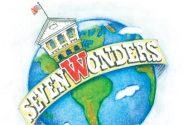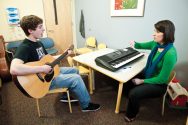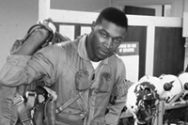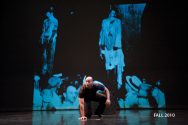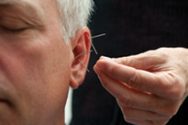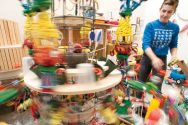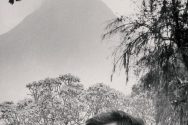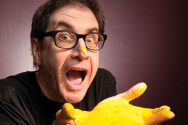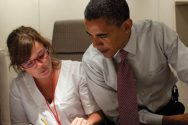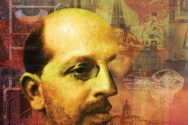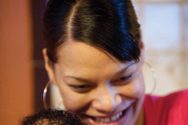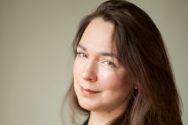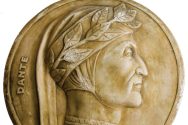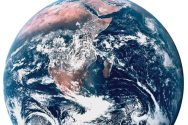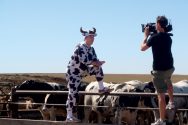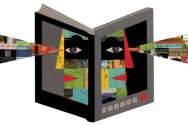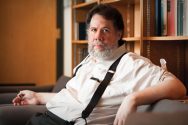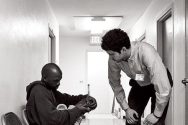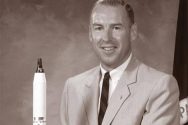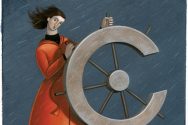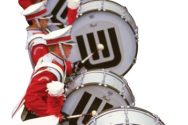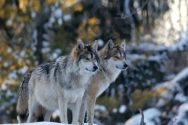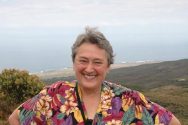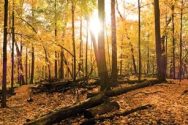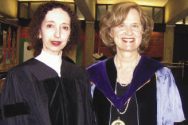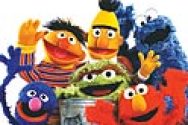We offer seven examples of life-changing UW discoveries, knowing full well that it’s only a start. Think back and add a favorite to our list, then learn what’s afoot at the new Wisconsin Institutes of Discovery.
Features
396 stories. Showing page 13 of 14.
We take them for granted — until we suddenly lose them, that is. Thanks to an unusual clinic, people who rely on their voices to make a living have a place to turn for help.
The welcome mat is out when today's soldiers return to campus, unlike what their Vietnam counterparts experienced while reentering civilian life during an uncivil era.
As a graduate student, theater professor Patrick Sims became engrossed in the story of lynching survivor James Cameron. For a decade, he's been working to create a one-man play that preserves Cameron's place in history.
David Rakel is one of the pioneers in the field of integrative medicine, which combines conventional and alternative treatments. He believes the discipline's emphasis on prevention can help cut rising health care costs, but skepticism remains.
From the university's earliest years, the arts have held a special place on campus — for those who create or perform and for those who experience the results.
Before Jane Goodall and Dian Fossey, there was George Schaller MS’57, PhD’62, whose crusade to protect the world’s most beautiful and endangered animals has taken him to the globe’s most remote regions.
Barry Levenson makes a compelling case for his chosen condiment.
When President Obama turns to the who, what, when, and where of his daily agenda, he has a Badger to thank.
The flamboyant Joseph Jastrow founded the UW’s psychology department and helped shape the fledgling science.
This is one top ranking that Wisconsin doesn’t want. Working together, public-health experts hope to reduce the shocking mortality rate among African-American babies.
It’s a writer-to-writer conversation when Mitchard sits down for a chat with Lorrie Moore, acclaimed fiction author and UW faculty member.
Chancellor Biddy Martin PhD’85 describes the incomparable role of the humanities in helping us discover what it is to be human.
The UW’s legacy with environmental issues started in the 1860s when student John Muir embraced nature. It continues evolving on today’s campus, where classes meld filmmaking skills with community activism.
Can Tyler Knowles ’05 pull off his first film with a small crew, a fictional beer, a road trip peppered with Badgers, and a cow costume?
As profit margins shrink and technological change speeds up, academic publishers face an uncertain future — but the UW Press is adapting to the new realities of bookselling in the twenty-first century.
Influenced by his activist father, photographer Frank Espada, and his own struggles with poverty, Martín Espada ’81 uses his poetry to speak for the downtrodden and the forgotten.
Gaining hands-on experience, helping those who have nowhere else to turn, and contributing to the UW medical school’s culture of giving back‚ it’s all woven into student-organized clinics like this one at Grace church.
If Hillel asked us, here’s what On Wisconsin would place in a time capsule in the organization’s new Barbara Hochberg Center for Jewish Student Life.
By necessity, Americans have tightened their belts during the economic downturn‚ but will the valuable lessons learned bring lasting changes to our relationship with money?
Some of the most popular quotations ever to infiltrate our culture were contributed by UW alumni. Prepare to be inspired, challenged, or simply entertained.
After the initial shock of hearing a grave health prognosis comes the confusion. But thanks to a unique UW program, patients can count on help to weigh the options and chart their own paths.
Stephen Thompson ’94, editor of National Public Radio’s music Web site, didn’t miss a beat when we asked him to pick five songs that say the UW. His advice for how to defend a song that you like? “If you think it’s awesome, it’s awesome.”
Thirty-five years ago, Wisconsin had no gray wolves. Today it has more than it knows what to do with. Now UW researchers are trying to help the state figure out how many wolves it wants and needs.
American automakers have taken their share of wrong turns, but 2009 has been the worst year ever. Can UW-Madison step in with ways to help them get back on the road?
Lynn Margulis MS’60’s penchant for independent thinking and controversial ideas has helped her to advance novel theories despite fierce opposition. As a result, she has changed the way we view evolution.
During its seventy-five years and the changing of the seasons, the UW Arboretum has told stories to those who will listen and learn. Even as visitors escape the demands of city life to enjoy its beauty and tranquillity, it has taught researchers just how much human forces shape the land.
Today’s students know that by graduation, their portfolios of knowledge and skills need to include global competence. But the UW, along with its peers, is grappling to define what that means, exactly, and why in the world it matters.
An academic setback at the UW propelled Joyce Carol Oates MA’61 on to the pinnacle of literary achievement. Read how Madison changed her life, and find an excerpt from “Nighthawk,” her campus memoir.
Conventional wisdom says that TV is bad for kids, but research is finding that good messages can prevail — if parents choose programming wisely.
